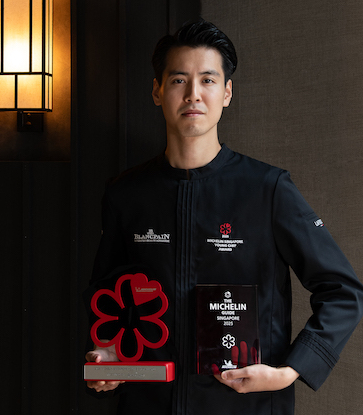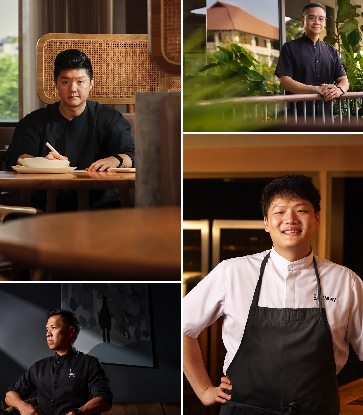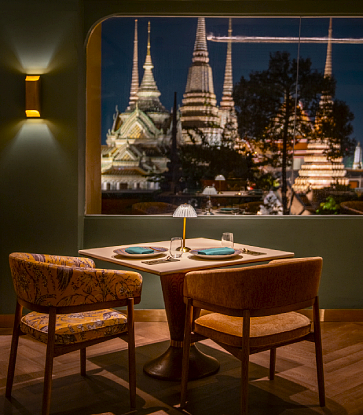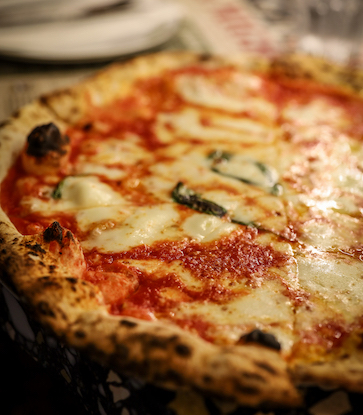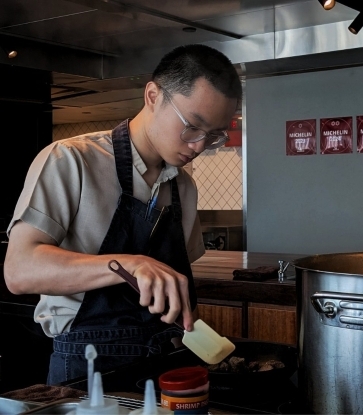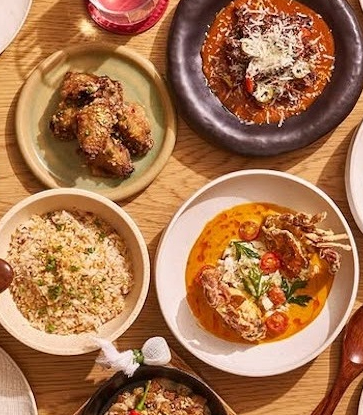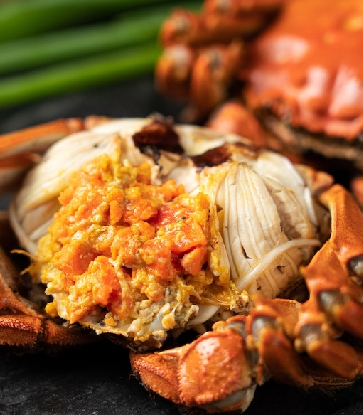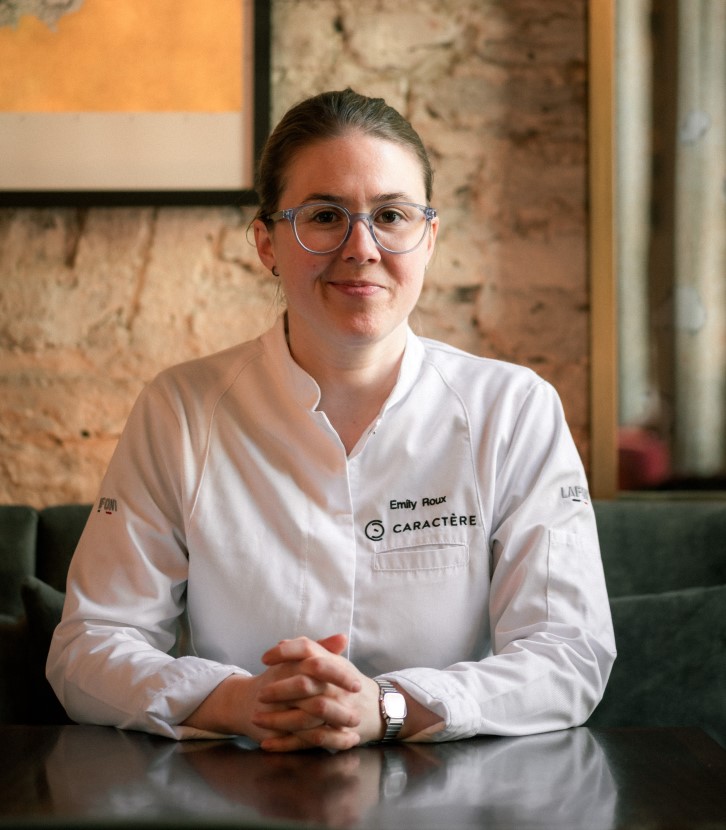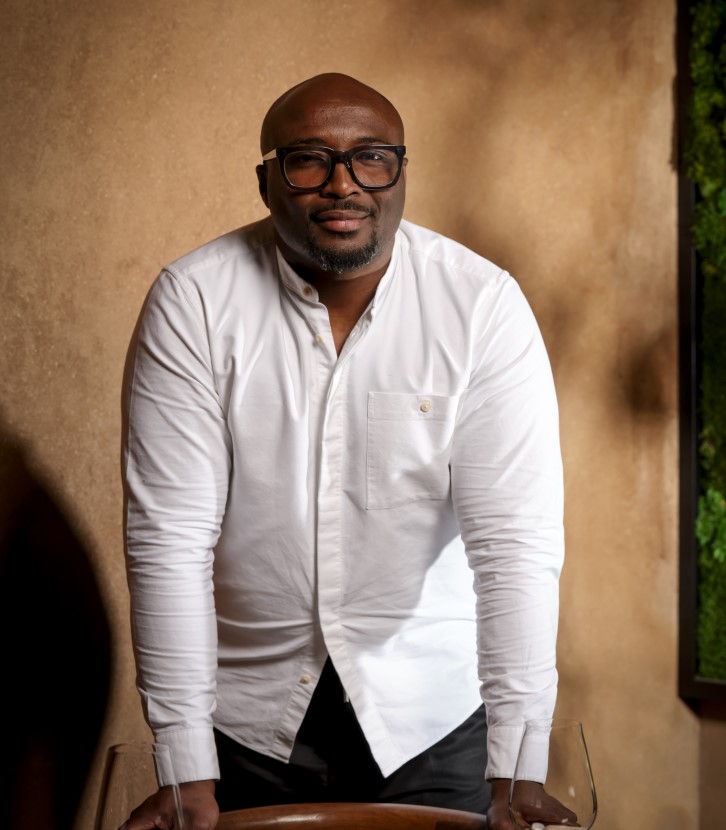When it comes to the topic of sustainable cooking, Simon Rogan is a chef whose name instantly comes to mind. With a slew of MICHELIN-starred and MICHELIN Green Star restaurants under his belt such as L'Enclume in the UK and Roganic in Hong Kong, the British chef is motivated by the zero-waste movement, displaying an unwavering dedication to ensure the origin and traceability of the ingredients used, and ensuring that every dish incorporates locally sourced produce.
We had a chat with Rogan about his thoughts on sustainability in Singapore, where he is holding a chef's residency at The Fullerton Bay Hotel Singapore this October 2023.
“I look forward to cooking in Singapore and bringing my farm-to-fork ethos to one of my favourite cities, which I love for its vibrant food scene. I’ll be cooking a menu in my signature style that includes some of my best-known dishes alongside a few new ones, using ingredients local to Singapore and from the region,” says Rogan.
Rogan's distinctive culinary approach revolves around a profound emphasis on ingredients, classical culinary methods, and a minimalist philosophy towards food. His dishes, which are exquisitely intricate and artfully composed, are renowned for their change in rhythm with the ever-shifting natural world. Our MICHELIN Guide inspectors describe his three-MICHELIN-starred and MICHELIN Green Star restaurant, L'Enclume, as energetic and a memorable experience, with classic dishes having been reworked and refined, while stunning new plates slotting their way seamlessly into the set menu. On the other hand, MICHELIN-starred Roganic in Hong Kong, which is also recognised with a MICHELIN Green Star, is known for its farm-to-table concept, with micro-herbs grown in-house and sustainable ingredients sourced from local organic farms. The tasting menus at Roganic present seemingly simple dishes that burst with flavours and amazing textures — a nod to the Rogan's philosophy and ethos.

How do you feel about achieving sustainability in a city like Singapore?
Singapore is a unique country with a high population density and is very different to what we are used to in the UK and in Europe. Cities are incredibly difficult places when it comes to sustainability, and that is why the "30 by 30" commitment (to produce 30% of Singapore’s nutritional needs by 2023) is such an important mission.
What potential do you see in Singapore as a destination with “sustainability-focused” cuisine? We ask this question because the country imports majority of its food supply from overseas.
I think there is potential for Singapore to be a great example to other countries and cities of how sustainability could be implemented even in the most unique of circumstances. Again, going back to “30 by 30”, it is a radical commitment, which is exactly what we need other countries to understand and to learn from. As a fellow island nation, in the UK, we are making a commitment to sustainable fishing, and it’s great to see Singapore implement that as well.
Singapore is also incredibly technologically advanced, which will be a great advantage when it comes to the speed and efficiency of the green agenda. Although imports cannot be erased entirely, I believe that Singapore is very capable of reaching a level of sustainability that will be attractive to its foreign visitors.
“I believe that Singapore is taking the right steps to ensure a greener future and to develop its economy in a new direction, with a great emphasis on agriculture.”

Can you tell us about some of the dishes that you will be serving at your Singapore residency?
My menu will give diners a taste of the beautiful Lake District, and the wonderful ingredients that we have there. Diners can look forward to signature dishes, which are a great representation of what we do at L’Enclume, such as Berkswell pudding caramelised in birch sap. We will also be presenting the Frozen Tunworth cheese, which is a transition between the main course and the dessert — like a savoury cheese ice cream, layered with malt, quince, and lemon thyme.
Another signature dish that we are excited to share with diners in Singapore is the Seaweed Custard — melting, soft warm custard topped with our own blend of caviar and finished with a lovely beef broth and bone marrow.
We will, of course, focus on seasonal ingredients that will change depending on what we can get our hands on.

How is mindfulness linked to sustainability?
Mindfulness and sustainability are very closely aligned, in my opinion. Sustainability is about treating what you have with care and consideration. It’s about understanding that nature is fragile, and that if we want to enjoy it for years to come, we need to treat it with respect.
Sustainability is also exercising mindfulness about your own needs. It introduces an intentionality to the way we eat. I always say that the best ingredients are the ones that are in season because they are at their freshest. In order to have a great product, the building blocks have to be great, too, and we need to be aware of how to select them.
(Photo: Christian Barnett)
RELATED: Living a More Sustainable Life with Simon Rogan
Any local Singaporean food that you're keen to try?
I love herby, fragrant curries. My favourite thing to cook at home is a Thai green curry; and so, I am excited to try a range of curries here in Singapore — especially the laksa. One can’t come to Singapore without having some Hainanese chicken rice, too, it’s such an iconic dish. Each family has its own way of cooking the dish, and I appreciate how personal that is. Fish head curry is also something that I am keen to try — what a great way to use the whole fish!
How do you think we could extend sustainability to Singaporean hawker centres?
Hawker centres are an iconic part of Singapore and a great celebration of the different cultures that live side by side in the republic. I think that like many food services in major cities, the main issue that hawker centres face is waste, which I believe can be reduced through recycling and composting. Logistically, this is a very difficult project, but I believe that with "30 by 30", people will be inspired to make changes in the way that they produce and consume, and this will naturally involve the hawker centres.
RELATED: 11 Singaporean MICHELIN Chefs Tell Us Their Favourite Hawker Dishes and Where to Enjoy Them
“There needs to be a better understanding of what can be done with surplus food and the role that composting and recycling can play. ”

With the super fast-paced lifestyle exhibited in Singapore, please share with us some tips on sustainable consumption.
My advice to anyone who wants to be more mindful about what they eat is to choose seasonal produce that is at the peak of its ripeness. For example, with modern farming methods and imports, strawberries are available all year round. But despite this, they are still best during the summer months. A winter strawberry will simply not be as fragrant and juicy as one harvested in the summer.
Choose produce from reputable farmers or producers. Not only do you support their businesses and better farming practices, but you can also be certain that what you are buying is of the best quality. The same goes for hawker stalls. If you know someone is going above and beyond with what they serve, support them.
(Photo: Christian Barnett)
You can eat sustainably in a fast-paced environment. For example, you can have a few recipes that are quick and easy to make, but that use a small and select number of ingredients to prepare. If these ingredients are good quality, even the simplest of meals can be very tasty.
Plan ahead. Don’t buy food that you won’t eat and which will only sit in your fridge. You can also aim to use as much of your produce as possible; for example, not throwing away your peels and making stocks from leftover bones, or drying wilted herbs to use them in seasoning. There are many ways to minimise kitchen waste that will also save you money and effort in the long term.
Sustainable dining is nourishing, delicious, and incredibly rewarding. A piece of fruit or vegetable that is perfectly in season will have an amazing flavour and will be a joy to eat. Of course, fast food can be delicious and we are all not immune to it, but on the whole, the convenience and the instant gratification that you get from fast food cannot compare to fresh produce, in my opinion.
Catch Simon Rogan's chef's residency at The Fullerton Bay Hotel Singapore from 3-14 October 2023 (excluding 8 and 9 October), starting from S$268* per person. Vegetarian menus are available upon advance request. This culinary event is by reservation only. Book your seats here.
Header image by Christian Barnett.




